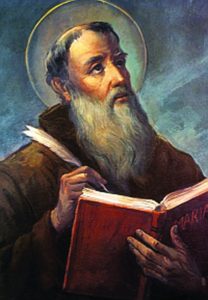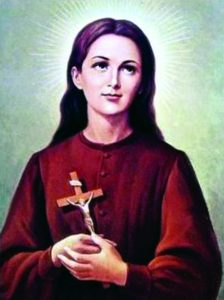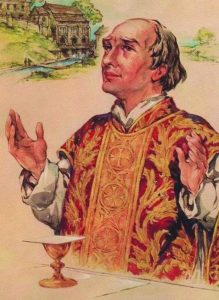July Saints

By Kilian de Lacy

Feast: 21 July
Saint Lawrence
of Brindisi
(1559-1619)
Lawrence was born in Brindisi, Italy, and named Caesare de Rossi. At the age of 16, he became a Franciscan and took the name Lawrence. Well-educated at the University of Padua, he began preaching soon after ordination.
In 1596, he became a high-ranking superior in the Order, and five years later was sent to Germany where, with Blessed Benedict of Urbino, he founded several priories.
Elected vicar-general of the Order in 1602, he refused re-election, going instead to Madrid to persuade King Philip of Spain to join the Catholic League. He served as papal nuncio to the royal court of Bavaria until he retired to a monastery at Caserta, Italy, in 1618. Summoned to Spain to settle a problem with the duke of Osuna, the arduous journey brought about his death. He was proclaimed a Doctor of the Church for his holy and brilliant writings.
Saint Lawrence, help us to develop a true devotion to the Church’s teachings.
Encyclopedia of the Saints, Matthew, Margaret & Stephen Bunson

Feast: 13 July
Saint Clelia
Barbieri
(1847-1870)
Clelia Barbieri was born in Budrio, Italy. Her father was the poor servant of the district’s doctor and her mother gave up a comfortable and well-to-do life to marry him. As a young child, Clelia asked her mother, “How can I become a saint?” As she absorbed the knowledge and love of God, Clelia was also learning the arts of sewing, spinning and weaving kemp.
The cholera epidemic of 1855 took Clelia’s father, leaving the family in very straitened circumstances. However, the doctor, Clelia’s uncle, generously made available a home near the parish church for the widow and her two daughters. The girl’s activities revolved around her manual tasks and praying in the church.
Although it was unusual for a child to receive First Holy Communion, this privilege was allowed Clelia at age eleven. On the same day she had her first mystical experience: an acute awareness of sin and its effects. From then, the crucifix and our Lady of Sorrows inspired her. She became a catechist for the local parish and was filled with joy and happiness, which spilled over to her companions. A fervent faith burned within her and she felt she must give herself for all God’s poor.
Clelia became one of the Christian Catechism Workers, previously a largely male group. Other young girls joined her and the Little Sisters of Our Lady of Sorrows were born. The community dedicated itself to a life of service springing from the Eucharist and involving teaching catechism to the farmers and labourers of the area.
Mother Clelia suffered intense physical and moral sufferings, but her faith and devotion to prayer were always extraordinary. Dormant tuberculosis which she had always carried flared up only two years after she had founded the order, and she died at the age of 23 on 13 July 1870.
Saint Clelia, obtain for us the deep desire for holiness.
Source: Internet, various

Feast: 19 July
Saint John
Plesington
(d. 1697)
One of the Forty Martyrs of England and Wales, John was born at Dimples, Lancashire, England, the son of a Royalist Catholic. Educated at Valladolid, Spain, and St Omer’s in France, he was ordained in Segovia in 1662.
John returned to England after ordination and served as a missionary in Cheshire. He became a tutor at Puddington Hall near Chester until his arrest. He was imprisoned for two months, and then hanged, drawn and quartered for the crime of being a Catholic priest. From the scaffold he spoke the following: But I know it will be said that a priest ordayned by authority derived from the See of Rome is, by the Law of the Nation, to die as a Traytor, but if that be so what must become of all the Clergymen of the Church of England, for the first Protestant Bishops had their Ordination from those of the Church of Rome, or not at all.
Saint John, help us to be faithful unto death.
Source: Encyclopedia of the Saints, Matthew, Margaret & Stephen Bunson
Tagged as: Saint Clelia Barbieri, Saint John Plesington, Saint Lawrence of Brindisi
Comments are closed.
 Entries(RSS)
Entries(RSS)